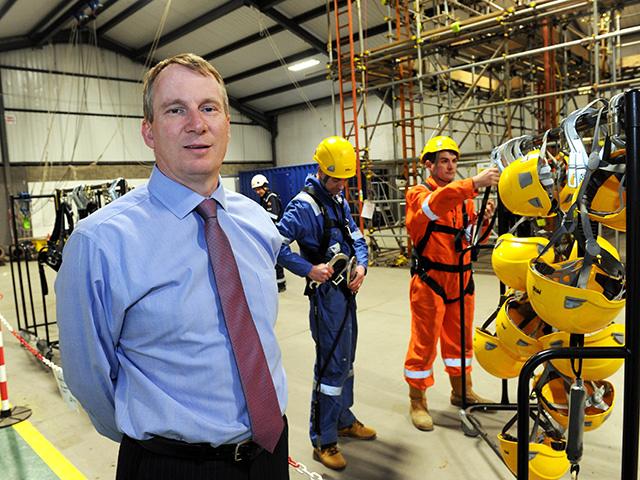
As a support services brand, Salamis has been a familiar part of the North Sea since 1973 and, for 22 years, the business belonged to Maersk. It was bought by Bifinger Berger Industrial Services in 2006, and in March was part of a group-wide rebrand, becoming Bilfinger Salamis UK.
Though little known offshore, Bilfinger is a large German group with a strong track record in heavy engineering and construction. It is also a major player in industrial services, which has become a fast-growing part of the business. Today, industrial services accounts for the largest chunk of the group which employs 38,000 people.
The UK unit makes a big contribution to this success story and accounts for nearly 10% of the overall industrial services workforce. The North Sea is a subset of this and is run out of Aberdeen and Stavanger.
But why rebrand seven years after acquisition?
“This is about showing to the market just how much power is at our elbow,” says Bilfinger Salamis UK strategic development director Murray Strachan.
“However, Salamis deals only with offshore. While Bilfinger Salamis UK is a new name, the company is 40 years old in October. We are a long-established, leading provider of a portfolio of services . . . one of the top two in the North Sea.
“We’re looking to expand what we do, including more on decommissioning. A study has also been commissioned so we can determine whether we should broaden our offering.
The main thrust of the Bilfinger Salamis UK business is O&M (operations & maintenance). The work is based on long-term partnering style contracts and the offering comprises: fabric maintenance, inspection, alternative access, deck services, plus a variety of specialist services including intensive cleaning of the kind required during decommissioning, which is set to assume greater importance over the next few years.
“A developing area of our business is project work,” says Strachan. “We recently won the Shell Barge contract and there are other large-scale contracts that we’re currently negotiating or tendering.
“By project work I mean life extension and related activities where we would be the incumbent and have the capability of working both with the operator and tier 1 contractor . . . in other words brownfield. The Shell Barge campaign is one of the largest contracts of this kind that we’ve won.”
Bilfinger Salamis UK is looking to grow and broaden its inspection offering. The company already carries out work in partnership with “some very clever people” in terms of 3D surveying and drone-based inspection. This level of sophistication is seen as being increasingly important to the firm’s core offerings. There are other innovations too, such as the application of specialist composite solutions, and flange/bolt preservation systems.
“We’re working closely with others across the group, finding out what we do that the onshore companies don’t and vice-versa,” says Strachan. “It is a different game to offshore but we have capabilities that they would benefit from, including the provision of rope access expertise. They have asbestos capabilities so we’re looking to see how we can enhance what we do here. We currently sub-contract a lot of that. It will form a big part of decommissioning.”
Wind energy is also being explored. Like many, Bilfinger Salamis UK is looking at the possibilities. Bilfinger is already in wind-related construction (foundations) and services. The group manufactured the turbine foundations for the huge London Array development, for example.
Safety is of paramount importance for obvious reasons; not just within the Salamis business but across Bilfinger as a whole. Indeed there are working practices elsewhere within the group that are considered highly appropriate for the North Sea where the quest to work more safely never ends. As far as Strachan is concerned, this is not unidirectional; while the North Sea business can take some safety cues from the wider group, the opposite also applies.
This requires a highly skilled, loyal workforce, effective apprentice and graduate recruitment schemes and a sustained approach to training.
“We have a very large skills centre offering training in specialist technical services, working at height, and in confined space,” says Strachan. “There is an under-capacity in the north-east of Scotland with regard to such courses. We’ve even had people coming from as far away as Australia to attend and we see this as continuing and expanding.
“We have a lot to contribute to the energy industry of the future, that’s for sure,” he adds.
Recommended for you
